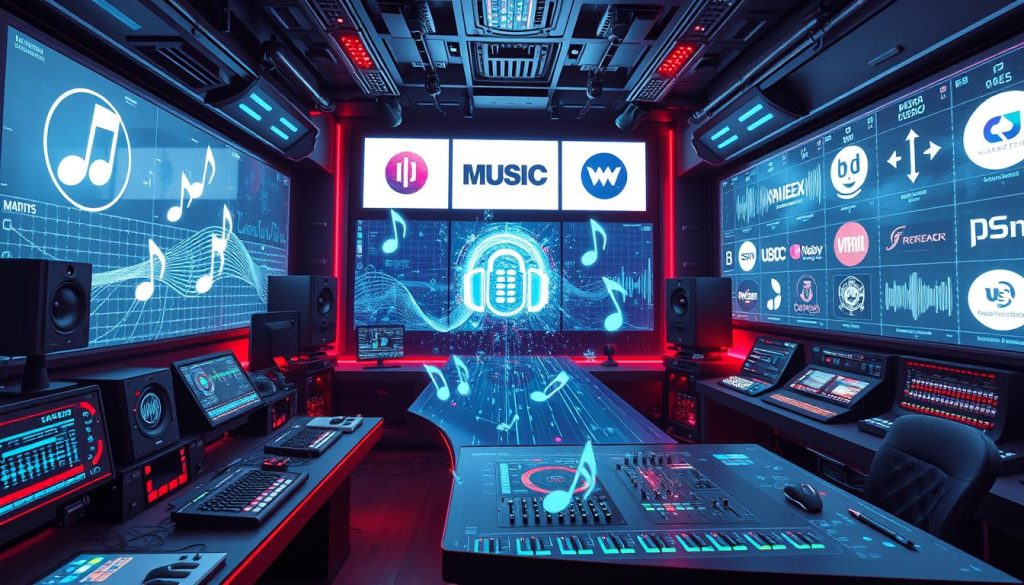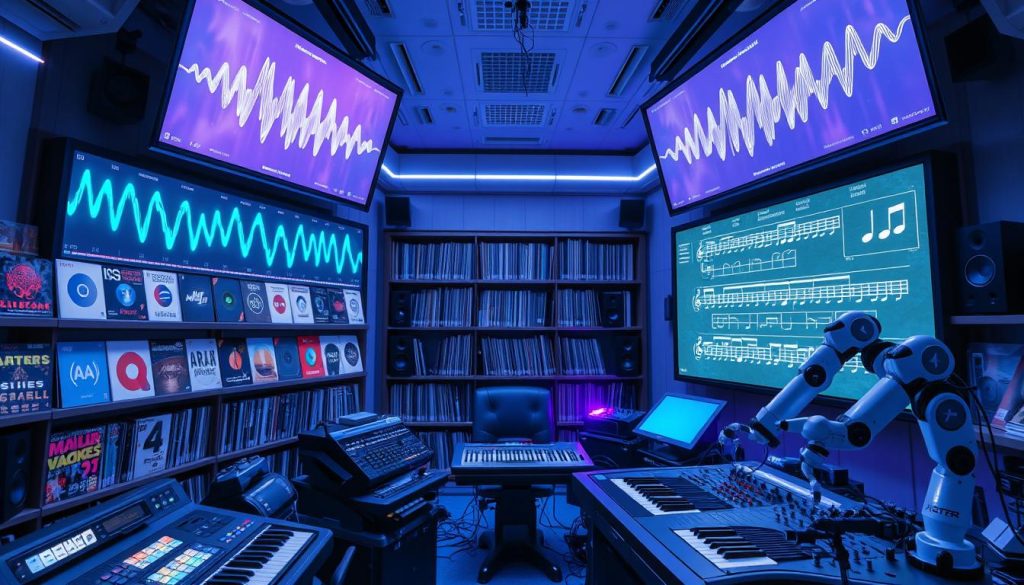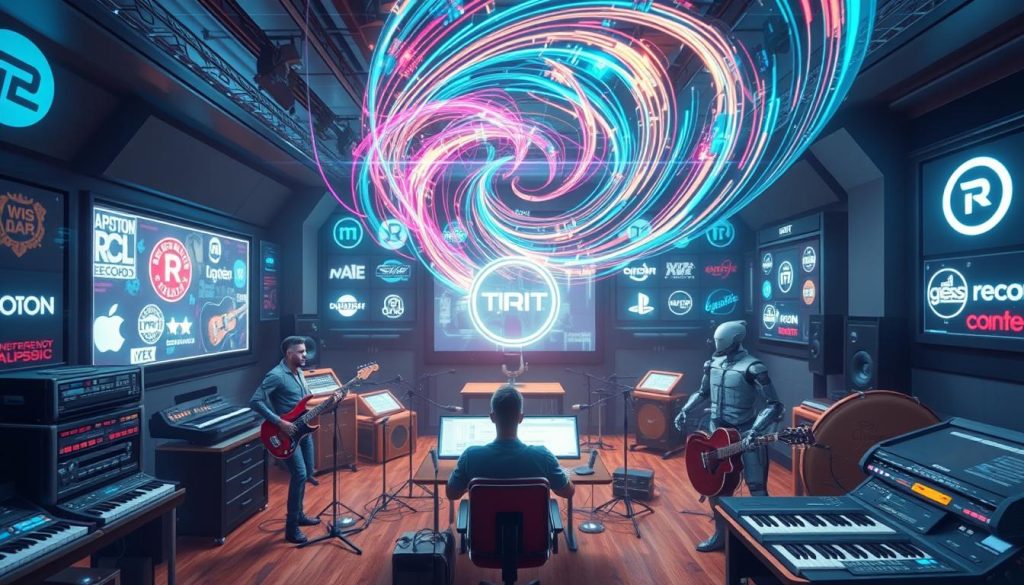The music industry has seen a big change with Artificial Intelligence (AI) in music making. Major record labels, the big players, have jumped on this new tech. They say it will change how music is made and heard1.
But, as you look closer, you see a big hypocrisy. This article will show you the truth behind major labels’ use of AI music2.
Key Takeaways
- Major labels have enthusiastically embraced AI technology in music production, touting its benefits.
- The data reveals a growing sense of hypocrisy in the major labels’ approach to AI music.
- This article will explore the contradictions and underlying motivations behind the major labels’ stance on AI music.
- Uncovering the hypocrisy can provide valuable insights into the evolving dynamics of the music industry.
- Understanding the major labels’ complex relationship with AI music is crucial for navigating the industry’s future.
The Rise of AI in the Music Industry
The music industry is seeing a big change with AI. AI is now used in many parts of music making and finding new songs. This change is big and exciting, showing how AI can change music3.
AI-Assisted Music Creation
AI is helping in making music. It can come up with new ideas and even sound like famous artists3. But, it also makes people wonder about human creativity and if it could lead to copyright issues3.
AI Music Composition and Curation
AI is also used for making and picking music. It looks at lots of data to find what people like, making playlists just for them4. This could change how we find and enjoy music, making it more personal4.
| AI-Assisted Music Creation | AI Music Composition and Curation |
|---|---|
|
|
As the music world keeps changing, AI will play a bigger part in it5. We need to think carefully about how to use AI in music. This way, the music industry and its artists can keep growing in the AI age5.
Major Labels’ Embrace of AI Music
The music world is buzzing with AI tech’s fast growth. Big record labels are fast to adopt it. They see AI’s value in making music and picking songs.
Universal, Sony, and Warner have sued AI music startups Suno and Udio for copyright issues6. Yet, AI tools boost creativity and speed in music making. For example, Suno can make songs like Bruce Springsteen’s and Michael Jackson’s6. Udio even made a hit song called “BBL Drizzy.”7
Big labels think AI can bring in new money by paying artists for AI music6. AI tools like Suno and Udio also make making music faster and cheaper6. By working with these startups, labels get new tech and stay ahead6.
AI can also help labels make more money and reach more people with different music6. AI gives labels smart choices on who to sign and what music to make6.
But, the lawsuits against Suno and Udio show AI music needs ethics and laws6. It’s about fair pay for artists and protecting music rights6. This situation reminds us of Napster’s legal battles in the early 2000s7.
As AI changes the music world, labels and AI startups must work together67. They need to set rules that protect everyone in music making and sharing67.
| Key Differences Between Napster and Suno & Udio Cases |
|---|
| – Nature of infringement: Napster facilitated direct user-to-user sharing of copyrighted music, while Suno and Udio are accused of incorporating copyrighted material into their AI training data. |
| – End product distribution: Napster’s model was based on direct user access to copyrighted music, while Suno and Udio are creating AI-generated content. |
| – Legal landscape changes: The legal framework and public perception of digital content ownership have evolved since the Napster case, which may impact the outcomes of the Suno and Udio lawsuits. |
| – Business model distinctions: Napster was a peer-to-peer file-sharing platform, while Suno and Udio are AI music creation and curation companies, leading to different industry dynamics and regulatory considerations. |
major labels AI music
The music industry is facing a big change with AI tools. Major record labels are using AI to analyze music and improve their work. But, they are careful about letting AI music out to the public8.
Big names like Universal Music Group, Warner Music Group, and Sony Music Entertainment see AI’s value. They use AI to find new trends and understand what people like. This helps them make smart choices about artists and marketing8.
But, these labels are not as open to AI music creation9. They’ve sued AI music tools like Suno and Udio for copyright issues. This shows they want to keep control over music creation and protect their rights.
| Key Lawsuits by Major Labels | Impact on AI Music Tools |
|---|---|
|
|
The major labels want to use AI for their own gain but limit AI music access9. This shows the industry’s complex relationship with AI. They want to use AI for themselves but keep it away from the public.
The debate on AI in music is ongoing. It’s unclear how major labels will balance their goals with the need for innovation and creativity9.
The Hypocrisy Unveiled
Major labels have talked up AI music creation, composition, and curation. But, a closer look shows hypocrisy in the industry10. They’ve been caught fiddling with fan data and streaming counts to make more money10.
Conflicting Stances on AI Music
On one side, labels see AI as a way to save money and work more efficiently10. But, they worry AI music could hurt the value of music made by humans11.
This mix of views leads to a confusing approach to AI in music. Labels praise AI’s benefits but also try to cheat the system for more cash10. They’ve faced backlash for how they treat artists, especially on rights and royalties12.
| Concerns | Contradictions |
|---|---|
This hypocrisy shows the need for more openness and fairness in the music world10. Labels must match their words with actions. They should support artists as they explore AI’s potential12.
Ethical Considerations and Debates
Artificial intelligence (AI) is changing the music world, leading to important talks about ethics. The use of AI tools like OpenAI’s MuseNet and Google’s Magenta has raised questions. These tools can create music in many styles, worrying about artists, creativity, and music’s true nature13.
Some see AI as a creative partner, helping artists explore new sounds13. Artists like Arca use AI in their music, making electronic sounds that go well with their own work13. But, there’s also worry about how AI might affect musicians’ jobs and earnings13.
Being open about music creation is key. People want to know when AI is used in songs to keep music real and valuable13. Also, laws in many places only protect music made by humans, making AI music hard to protect14.
Finding a balance between new ideas and keeping music real is crucial13. As AI gets better, the debates about its role in music will grow. We need to handle these issues carefully and thoughtfully15.
“AI will never replace the ‘soul’ of a human artist,” says Grammy winner Hans Zimmer. He stresses the need to keep music authentic and human13.
| Key Ethical Considerations | Potential Challenges |
|---|---|
| Artist Compensation | Concerns about the economic impact of AI on musicians and producers, particularly in terms of royalties and potential job displacement. |
| Creative Autonomy | Maintaining the human essence and authenticity of music in the face of AI-driven composition and production. |
| Transparency and Authenticity | Informing listeners when part of a song is generated by AI to avoid the devaluation of human creativity and maintain trust. |
| Copyright and Legal Implications | Navigating the legal landscape as copyright laws evolve to potentially include AI-generated works. |
The ethical considerations and debates about AI in music show how complex this issue is. The music world must find a way to use AI responsibly. This way, we can keep music real and creative while exploring AI’s possibilities131415.
Conclusion
The relationship between major record labels and AI music technology is complex and changing. The industry sees the benefits of16 but ignores the ethical issues17. This article tries to show this hypocrisy and push for a better conversation about16 and18 in music.
Data shows how fast16 is growing in music, with big companies losing 12% on Spotify from 2017 to 202216. A few artists make most of the money, with over 95% of royalties going to them in 202216. AI music startups like Endel are also popular, with a million users a month16.
As the industry deals with16 and18, it’s key for everyone to talk openly and ethically. This way17, technology can help all of music, not just a few17. By using16 and18 wisely and solving ethical problems, music can have a brighter future for everyone.
FAQ
What is the relationship between major record labels and AI technology in the music industry?
How are major record labels using AI in the music industry?
What are the ethical considerations and debates surrounding the use of AI in music?
How is the industry’s embrace of AI music creating a sense of hypocrisy?
What are the potential implications of the major labels’ use of AI in the music industry?
Source Links
- How Joe Rogan Remade Austin
- The High Cost of Selling Cheap Music Services
- The Sound of Litigation: Major Labels Take on AI Music Generators
- How Songwriters, Artists and Labels Are Evolving in the AI Era
- AI has breached the front lines of the music industry, causing concern for creatives and consumers – The Hilltop
- 6 reasons major labels need AI music tech like Suno & Udio
- Major Record Labels Sue AI Music Startups For Allegedly Copying Songs To Train AI
- Major Labels File Suit Against AI Music Start-Ups for Unlicensed Training
- Major record labels sue AI start-ups
- The Record Industry’s Fake Fight Against Streaming Fraud
- Grimes Reluctantly Considers Some Rules to Her No-Rules A.I. Vocal Project: ‘We Expect a Certain Amount of Chaos’
- Taylor Swift’s Camp Responds to Photographer’s Hypocrisy Claim
- AI-Created Music: Ethics and Debatable Considerations – Music Industry Weekly
- AI-Generated Music: Legal and Ethical Considerations
- Where Does the Buck Stop? Ethical and Political Issues with AI in Music Creation | Transactions of the International Society for Music Information Retrieval
- Analysts are starting to believe that AI may be an existential threat for the major labels. Is that overly pessimistic?
- Music labels sue AI music generators for copyright infringement
- Suno admits it trained on major-owned music, accuses labels of misusing copyright



